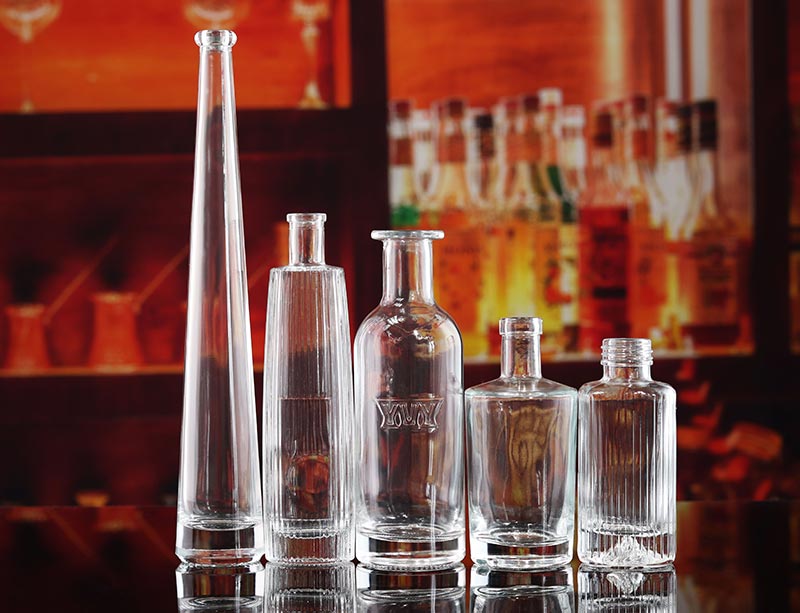Spirits are commonly stored and packaged in glass bottles for a variety of reasons, all of which contribute to preserving the quality, protecting the flavor, and enhancing the overall experience of consuming these beverages.

One of the primary reasons spirits are in glass bottles is the preservation of taste and quality. Glass is a non-reactive material, meaning it does not interact chemically with the contents of the bottle. This ensures that the original flavors and characteristics of the spirits remain intact. Unlike other materials, such as plastic or metal, glass does not introduce any unwanted flavors, odors, or contaminants that could alter the taste of the beverage. As a result, consumers can enjoy the true essence of the spirit as intended by the distiller.
In addition to preserving taste, glass provides a reliable barrier against external factors that can compromise the quality of the spirits. Glass bottles offer excellent protection against light, which can cause the degradation of certain compounds in the liquid, resulting in undesirable taste changes. Moreover, glass is impermeable to oxygen and moisture, preventing oxidation and the growth of microorganisms that can spoil the beverage. By minimizing exposure to these elements, liquor glass bottles help maintain the stability and longevity of spirits, ensuring they remain fresh and enjoyable over time.
The visibility and presentation of spirits are also important considerations. Glass bottles allow consumers to appreciate the appearance of the liquid inside. The transparency of glass showcases the color, clarity, and viscosity of the spirits, which can contribute to the overall drinking experience. Whether it's the rich amber hue of whiskey or the crystal-clear purity of vodka, the visual aspect of spirits can be enticing and captivating. Glass bottles effectively highlight these aesthetic qualities, making the product visually appealing to consumers.
Furthermore, glass bottles offer an elegant and sophisticated presentation. The timeless appeal of glass lends an air of quality and craftsmanship to the spirits. The smooth and sleek surface of a glass bottle, often complemented by intricate labeling, embossing, or etching, conveys a sense of refinement and attention to detail. This can enhance the perceived value of the spirits and create a positive impression among consumers.
Sustainability and recyclability are increasingly important factors in packaging choices. Glass bottles are highly recyclable and can be reused or repurposed multiple times without losing their quality. This makes them an environmentally friendly choice compared to other packaging materials. By using glass bottles, the spirits industry can contribute to reducing waste and minimizing its impact on the environment. The sustainability aspect aligns with the growing consumer preference for eco-friendly products and can enhance the brand image of spirit producers.
Moreover, glass bottles have a strong association with tradition and prestige in the spirits industry. Many established spirit brands have a long history and heritage, and the use of spirit glass bottle reinforces that sense of tradition. The use of glass can evoke a sense of nostalgia and authenticity, reminding consumers of the craftsmanship and care that goes into producing these spirits. Glass bottles also add a touch of luxury and sophistication, which resonates with the premium positioning of many spirits in the market.
In conclusion, spirits are primarily packaged in glass bottles for several reasons. Glass ensures the preservation of taste and quality, protecting the beverage from unwanted interactions and maintaining its original flavors. Glass provides a reliable barrier against light, oxygen, and moisture, safeguarding the spirits from degradation and spoilage. The transparency and visual appeal of glass bottles allow consumers to appreciate the color and clarity of the spirits, enhancing their drinking experience. Glass is a sustainable and recyclable material, aligning with environmental concerns and consumer preferences. Finally, glass bottles convey tradition, prestige, and craftsmanship, aligning with the image and branding of many spirit producers. Overall, the use of glass bottles for spirits combines practicality, aesthetics, and tradition, ensuring that the product remains fresh, visually appealing, and aligned with consumer expectations.
Previous: Benefits of UV Curable Ink in Screen and Digital Printing
Next: Biodegradable Packaging Bags: A Sustainable Solution for the Future
Copyright:@2020-2021
Comments Please sign in or sign up to post.
0
0 of 500 characters used